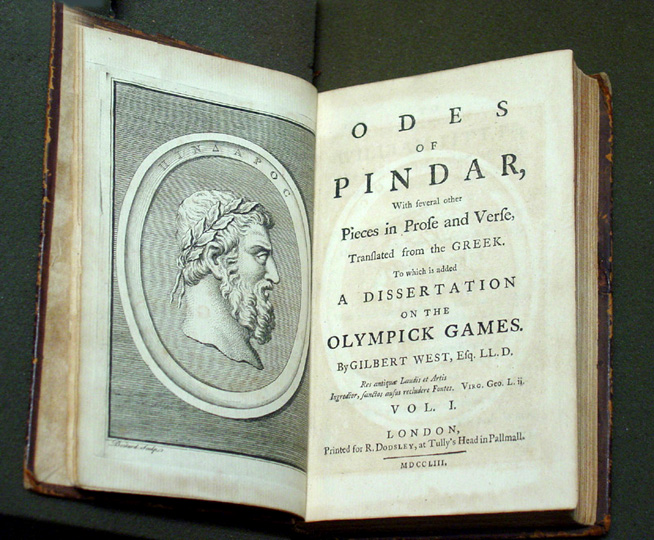Tuesday, February 16: Mystery Masterclass
In honor of the Vancouver games, here is a mythological account of the origin of the Olympic Games as recounted by Pindar, a Greek lyric poet of the Fifth Century B.C.
—JLW

THE ORIGIN OF THE OLYMPICS
by Pindar1
Of that light in the life of a man before all other deeds, that first of contests, the ordinances of Zeus have stirred me to sing, even the games which by the ancient tomb of Pelops the mighty Heracles founded, after that he slew Cleatos, Poseidon’s goodly son, and slew also Eurytos, that he might wrest from tyrannous Augeas against his will reward for service done.2
Lying in ambush beneath Cleonai did Heracles overcome them on the road, for that formerly these same violent sons of Molos made havoc of his own Tirynthian folk by hiding in the valleys of Elis. And not long after the guest-betraying king of the Epeans saw his rich native land, his own city, beneath fierce fire and iron blows sink down into the deep moat of calamity. Of strife against stronger powers it is hard to be rid. Likewise Augeas last of all in his perplexity fell into captivity and escaped not precipitate death.
Then the mighty son of Zeus having gathered together all his host at Pisa, and all the booty, measured a sacred grove for his sovereign Father; and having fenced round the Altis3 he marked the bounds thereof in a clear space, and the plain encompassing it he ordained for rest and feasting, and paid honour to the river Alpheos together with the twelve greatest gods. And he named it by the name of the Hill of Kronos; for theretofore it was without name, when Oinomaos was king, and it was sprinkled with much snow.
And at this first-born rite the Fates stood hard at hand, and he who alone proveth sure truth, even Time. He travelling onward hath told us the clear tale of how the founder set apart the choicest of the spoil for an offering from the war, and sacrificed, and how he ordained the fifth-year feast with the victories of that first Olympiad.
Who then won to their lot the new-appointed crown by hands or feet or chariot, setting before them the prize of glory in the games, and winning it by their act? In the foot-race down the straight course of the stadion4 was Licymnios’ son Oionos first, from Nidea had he led his host: in the wrestling was Tegea glorified by Echemos: Doryclos won the prize of boxing, a dweller in the city of Tiryns, and with the four-horse chariot, Samos of Mantinea, Halirrhothios’ son: with the javelin Phrastor hit the mark: in distance Eniceus beyond all others hurled the stone with a circling sweep, and all the warrior company thundered a great applause.
Then on the evening the lovely shining of the fair-faced moon beamed forth, and all the precinct sounded with songs of festal glee, after the manner which is to this day for triumph.
- Translated by Ernest Myers, M.A., 1905. I’ve changed a some of the spellings of names to ones more familiar, e.g., “Heracles” instead of “Herakles” and so forth. The notes are mine. [↩]
- Cleatos, more usually spelled Cteatus, and Eurytus were brothers and nephews of King Augeas, whose stables Heracles famously cleansed by redirecting a river through them, and with whom he had a quarrel. In the next paragraph, they are referred to as the “violent sons of Molos”. [↩]
- A grove of trees sacred to Zeus; the present site of Olympia. [↩]
- Not an English word: in this context it refers specifically to the racecourse at Olympia, which was a “stadion” in length: more generally it means a length of about 200 meters. [↩]




















I’m surprised that nobody picked up on the crime connection, here.
The Olympic Games were made possible by a murder. In California, at least, homicide by ambush is First Degree Murder and a capital felony.